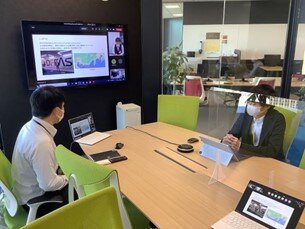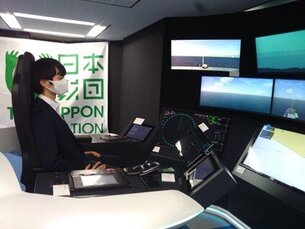ACTIVITYActivity reports
- HOME
- Activity reports
- Report on Internship at BEMAC Corporation (IMAI, Course of Maritime Technology and Logistics)
Report on Internship at BEMAC Corporation
(IMAI, Course of Maritime Technology and Logistics)
I did a month-long internship in October. The company I interned with was BEMAC Corporation, which produces switchboards for ships, among other things. Their head office and factory are located in the city of Imabari in Ehime Prefecture, but they have a branch office in Tokyo, and a Tokyo Data Lab that performs the work of data utilization. I had the opportunity to take part in AI-based data utilization at the Tokyo Data Lab.
The task we worked on was anomaly detection in the power systems of ships. All the important equipment on a ship uses electricity. One example is the steering gear, which is used to alter or maintain the ship's course. If something goes wrong with a ship's power system and the onboard power supply goes out, it becomes impossible to steer the ship, which could lead to collisions, running aground, or other types of accidents. BEMAC does troubleshooting by analyzing power system data. Our task was to explore whether we could streamline the work using machine learning to detect anomalies in time series data on power system components such as the flow of electricity from generators.
They had already developed a system that relied on a machine learning model to detect anomalies in time series data, but the model often gave false positives, and thus was not good enough to use in real-world operations. Accordingly, the main task during the internship was to improve the performance of the system either by adjusting the existing model or switching to a new one. To prevent the spread of COVID-19, we did nearly all the work remotely, but I had no problems getting through the work because my mentor gave suggestions when needed.
Anomaly detection in our case was plagued by the difficulty of differentiating between normal and abnormal data because there was so much more normal data than abnormal data. Thanks in part to my mentor' s suggestions, I was ultimately able to incorporate a model I devised into the program. However, I was not able to improve the performance of the system beyond the existing level. In one month, I gained first-hand experience as to the difficulty of applying AI to real-world data.

Image of the final report presentation
Also, because BEMAC is part of the DFFAS project for designing fully autonomous ships, I had the opportunity during my internship to tour the Terrestrial Support Center, where ships are monitored from shore. The DFFAS is an immense project involving not only shipping companies, but also entities in a wide range of other industries including telecommunications, nautical instruments, and shipbuilding. From what I hear, Japan is the only place in the world where this kind of cooperation between so many companies is possible, and I could feel their passion to make Japan the world leader in developing fully autonomous ships.

Me sitting in the remote cockpit at the DFFAS Terrestrial Support Center
One month is not a very long time, but I enjoyed a valuable opportunity to try applying AI to real-world data in an actual company. I would like to express my gratitude to everyone who took such good care of me at BEMAC, and to everyone else who supported this internship program.
IMAI, 2nd year student, Course of Maritime Technology and Logistics

